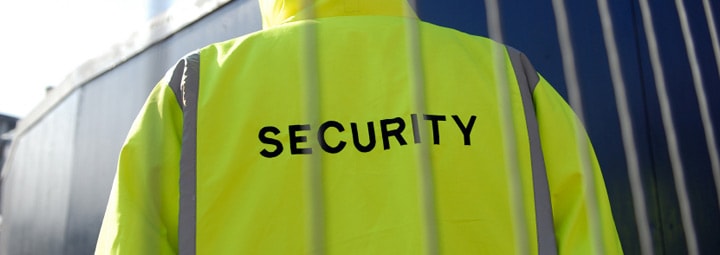
Being a security guard can be a risky business. Whilst their role is to protect, it’s easy to overlook their own personal safety. Lack of adequate safety measures can put a security guard at unnecessary risk, so regardless of whether their job is to protect people, property, or assets, being equipped with the right protection is crucial to ensure their personal safety isn’t compromised.

So what protection is necessary for the security guard in order to reduce risk and allow them to carry out their duties safely? We’ve identified ten essential pieces of personal protective equipment that should be considered by both employees and security guards.
Communication is critical for security guard safety. Two-way radios are a common communication method for close protection officers, or a security guard working at events or in retail. Designed to swiftly communicate information over long or short distances, a two-way radio will allow a security team to communicate effectively and easily activate instant backup if a situation becomes dangerous.
Smartphones are indispensable in today’s continually connected world. 80% of the UK population now own one and it’s hard to imagine a day without one. It offers the security guard a powerful mobile communication tool, with access to the internet and a camera, it enables you to plan and react to unforeseen circumstances. It also allows easy access to a range of apps, including rapid recording apps that allow issues to be captured and reported quickly and automatically.
Having access to a first-aid kit for self-help, or to render assistance to a colleague is the most effective way to help prevent an illness or injury from becoming more serious. Particularly in remote locations where medical care might be limited, the ability to administer first aid will help protect against minor trauma or wounds.
The very nature of a being a security guard means that they are often required to work on their own, and sometimes late at night when there may be an increased chance of threat. Technology has made a huge difference to the way in which security guards can now be protected. Lone worker protection systems can now be centralised and monitored via an app, making it simple to track the exact location of your security fleet and enable the security guard to easily raise an alarm in the event of an emergency.
A torch can be a handy piece of equipment; not only to aid your vision in the night, or if there is a power cut. But a torch can also be used in self-defence, a bright torch can dazzle an attacker giving you enough time to raise the alarm or make your escape. A large torch can also be used to protect yourself physically too, by blocking strikes by weapons such as bats or knives. You could also utilise a torch as a weapon to strike your attacker as a last resort.
Carrying a notepad and pen might seem outdated with today’s technology, but the batteries never run out with these! This is an essential piece of equipment for any security guard. A note pad is easily looked at to reference your all-important notes, names and numbers. It’s also useful to be able to jot down important information whilst you’re on the phone.
The severity of risk will largely depend on the environment in which you work, but working as a security guard you will face aggression or threats from time to time. Wearing protective clothing such as stab-proof vests will help protect you from any dangerous threats you may encounter. In some high-profile risk situations, ballistic vests may be more appropriate for those looking to convey a high level of vigilance and protection against every eventuality.
Most security guards will be on their feet most of the time, so it’s important to invest in appropriate and comfortable footwear that should be practical but durable, comfortable and look suitably professional.
An SIA licence is a necessity for most security professionals. It should be worn in a prominent position, usually the SIA issue lanyard or armband. Professionals working in the Close Protection sector are exempt from this requirement due to the frequently confidential nature of their work and the need to have a degree of anonymity. However, they need to have it on their person and be able to produce a valid licence on request from a Police Officer or SIA inspector.
Not only does hi-vis clothing distinguish you from members of the public, but it also alerts would-be criminals or trouble makers to your presence, which may deter them from attempting to break the law. Should you injure yourself or fall ill, it is also a lot easier to find you by day and night.